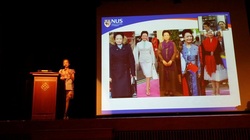 It was my great honor to be invited to make a spotlight presentation for the Chinese Internet Research Conference held at Hong Kong Polytech University this year! Thanks to David Herold, the organizers, and the steering committee for the flattering and daunting task! I still vividly remember that in 2007, I was also very fortunate to be given the top student paper when CIRC was held in Texas A&M hosted by Randy Kluver. Now seven years later, I ask myself what better I can offer to the community. I am not sure whether I have become a better researcher but at least, I am no longer alone. This time I have two fabulous collaborators, Dai Jia and Yang Tian, both from Tsinghua University. Their diligent working attitude and generous support have been the most critical reason why the paper is all possible. I opened the presentation with an example of China's current first lady, Peng Liyuan. While the international society sees Peng as the first ever Chinese first lady who can rival Obama's Michelle, many Chinese know Peng as a popular star. She has appeared in the first ever Spring Festival Gala and since then, her songs have been hits in China. Some media reports praise her for enhancing the national image by smiling and posing to the cameras. And for many Chinese, the fact that we know her, or her voice, so well has brought a sense of familiarity to the new leadership. Both the internal and external roles Peng has played in China's political life have every thing to do with her life of being a popular singer. I continued saying that this is definitely not just a Chinese case. The blurring boundary between popular culture and politics has been witnessed around the world. This observation has brought some scholars a great deal of uneasiness. Popular culture turns people from rational citizens to passive spectators, who watch their favorite stars preform but make no actions themselves. They may also become fanatic followers, who blindly do whatever their idols ask them to do. The fascination with celebrities makes citizens pay more attention to superficial qualities such as how one looks or how one speaks, and ignore the substantial criteria of being a politician such as experience, policy ideas, and visions. However, this worry is nothing new. As early as in the Ancient years in China, poets (popular singers at that time) already used poems (popular songs at that time) to mock and criticize the emperors and their empires. I argue that what we should worry about isn't whether popular culture is good or bad for politics (because politics is never simply good or bad). What we should worry about is why we still know so little about popular culture and politics, the endless seeking for pleasure, the strong desire for emotions, the structures of feeling! I argue that it is because our theoretical perspectives to examine politics are limited. One idealistic perspective sees everyday politics as deviant cases from the ideal model of democracy, such as rational debate indicated in Habermasian public sphere. Another realistic but a bit cynical perspective sees politics as power competition. It is all about exchange of interests (e.g., Bourdieu's theory of capitals). It is my argument that we should look at politics as performance. If we take this perspective, our focus is no longer on what is right and what is wrong. Politics is a matter of aesthetics and taste. We should ask, what is preferred, what is enjoyed, what is appreciated. We also would not see politics as a battle between the powerful and the powerless. How does the powerful repress the powerless, how does the powerless fight against the powerful. Instead, we talk about a relationship of performers vs. audiences. The dynamics of this relationship is much more subtle and complicated than simply being a competition among powers. Think about it: A show is not a show without audiences. If we see politics as performance, we may ask why celebrities want to perform politics. An obvious reason is to say celebrities use these political issues to keep their names in news. But why news? Why not the list of parliament members? It is because the importance of mediation is unprecedented nowadays. Although popular culture has always been a part of political communication, what marks our age is the extreme importance of mediation. We now have celebrities who are famous for being famous. They have no distinctive background, they have no outstanding achievement, they are not even pretty. Think about Furong Jiejie. What has made them so well known is the repeated exposure in media coverage. I concluded the theoretical part of this presentation with a research agenda, dictated by the perspective of politics as performance. I ask:
Although there is another methodological point I made about network analysis, I hope readers can stop at the theoretical points and think about how a perspective of politics as performance could inform our inquiry about Chinese Internet. A digital copy of the presentation is not posted in response to the conference audiences' concern of leaking privacy information of the celebrities and their followers. You are always welcome to write to me for the slides!
1 Comment
2013年年初发表在《中国传播学刊》的这篇文章,有幸受到了翻译社群的关注,得到了赵嘉敏(译言创始人)的转发。两个很有趣的网站,政见和北大新媒体也做了这个研究的分享。这些回应都符合我们做学术与现实结合的action research的初衷,在此表示感谢。
This meta-review has been published by Chinese Journal of Communication. See the link HERE. THe following would be some highlights of the books I found highly interesting to share. "Although Castells depicts the states as either oppressive or corrupt (under the influence of financial capital) in most instances, he rightly points out that "the outcome of the conflict (between the state and civil society, added by author) depends on the interplay between political interests in the country and geopolitical interests related to the country" (p. 97). When social activism reaches its most radical level as regime-overthrowing revolutions, states respond with most radical measures such as switching off the Internet in Egypt or extreme violence in Tunisia. However, the effects of such state responses vary across countries depending on the particular state's internal politics and its position in geopolitics. This analysis makes it clear that states are not independent powers and they have to exist in relation to global powers. Social activism, therefore, does not exist in relation to just a single government but to a network of powers." "Hoofd makes a compelling etymological analysis (pp. 6-8), showing that activism was originally coined by Rudolf Eucken as the ideology of energetic action to overcome the non-spiritual nature of human kind. This ideology was later applied to economic theories by Walter Eucken (son of Rudolf), who is deemed as “the predecessor of current neo-liberalism” (p. 7). According to Walter’s theory, the active attitude to life is essential for economies to counter depression. “Activism was an economic strategy originally employed for the benefit of the nation-state in which its citizens could supposedly enjoy the largest amount of ‘spiritual freedom’ through actively encouraged but closely monitored economic competition” (p. 7). The collusion between activism and neo-liberalism highlights the entangled relationship among civil society, state, and global capitalism. Hoofd suggests that social activism, despite its confrontational appearance, may have deep ideological connections with the network of powers." "A few chapters in Ford’s book highlight the problematic role of international NGOs and other global forces. Financial aid can lead to financial dependence, which allows international organizations’ peace-building programme to dictate the limits of local activists’ engagement in the peace movement in post-conflict Timor-Leste (Dibley, 2013). Appealing to international norms of human rights helps sexuality right activists in Malaysia to establish an alternative source of authority but invites heavy state sanction (Lee, 2013). Conflicts within the agendas of multiple international forces are made explicit in framing sex work as work vs. sex workers as victims of human trafficking in Cambodia (Sandy, 2013). Illustrating the entangled relationship between local and global politics, an important case is that a reprimand by the US Department of State on the Cambodian government was reported as an achievement of the Cambodian sex worker rights campaign. " Some of my ideas A network approach to examining social activism, I think, is appropriate, especially after knowing of the ideological connection between activism and capitalism that Hoofd argues. Instead of treating activism and capitalism as two separate processes, we should examine how social activism emerges, evolves, and diminishes in relation to the network of powers. Instead of seeing social activism single-directionally determined by neo-liberal capitalism, I would like to borrow the concept of “seduction” (Baudrillard, 1990) to describe the relationship between the two. I hereby use one example to illustrate the seducing relationship: Google is a company that makes profits based on searching through free and open content provided by Internet users and this profit-driven practice coincides with many activist appeals for freedom of expression or freedom of information flow. When Google exploits these causes and activists behind them, activists also try to demand moral or material support from Google to fulfill their goals, such as fighting against the state. It is hard to say who is in control and who is winning over whom. It is indeed a complicity suggested by Hoofd but the complicity goes both ways. What makes our research on social activism exciting is to make visible the rules, charms, snares, and lures involved in such seduction. 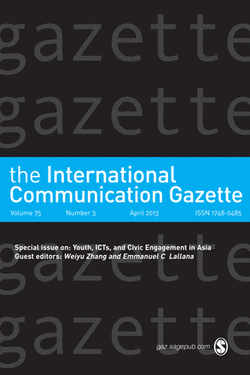 Our special issue on "Youth, ICTs and Civic Engagement in Asia" is published in International Communication Gazette!!! Thanks to my co-editor and project head Emmanuel Lallana, and dear collaborators Clarissa David, Mohammad Sahid Ullah, P. Vigneswara Ilavarasan, and Joanne Lim! Speical thanks to the editor, manager, and proofreader of this journal too. They are all so professional that this issue gets published smoothly and timely. Highly recommend my colleagues to submit to this journal! You can download the entire issue HERE! A table of content is found here.  Dhaka, Bangladesh Dhaka, Bangladesh The “Youth, ICTs, and Political Engagement in Asia” project spanned over three years from 2009 to 2012 and officially closed on November 15, 2012. The five-country (Singapore, Malaysia, Philippines, India, Bangladesh) comparative study was funded by International Development Research Center, Canada through ideacorp, the Philippines, after a competitive review process. A grant of SGD 170,000 was utilized to conduct 143 in-depth interviews and 41 focus group discussions. About 35 researchers were recruited, trained, and organized to contribute to this project. The project has been presented as a panel at the 19th Asian Media Information and Communication (AMIC) conference and the 2012 conference of International Association of Media and Communication Research (IAMCR).  Colombo, Sri Lanka Colombo, Sri Lanka We have completed an administrative report on this three-year journey we have taken part in. The process has been anything but comfortable, expected, or business as usual. We took great pain in detailedly documenting this process and hope that our experience would add into the practical wisdom about working in this region. For example, one sad loss is that we were unable to sustain a research partnership in Sri Lanka, a country that I set my own feet in and has inspired me tremendously. Although this administrative report would not be counted in any research institutes as academic publications, it nevertheless provides a rare account of doing research in developing countries and its various challenges. If you are wondering how tough a researcher's job could be, please click here. 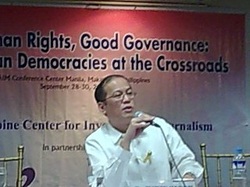 Noynoy Aquino Noynoy Aquino When the project started, Noynoy was still the son of Corazon and had little interest in contesting for the president. He was still free enough to participate in the anniversory event held by one of our Philippine partners. One blogger journalist asked a question about his hairstyle and he was not annoyed at all. Now the then fresh face in the Philippines politics became the 15th President. It is hard not to think that the young activists we have interviewed would become someone important enough to reset the trend and open up a new era of Asian history. One of our responsibilities is to articulate such potential based on what young activists themselves have told us and envisioned their future. Our Filipino collaborator, Dr. Clarissa David and I co-authored a short piece on the significant trends of digital activism among Asian youth and presented the findings at the CeDem Asia conference held in Singapore last year. Our presentation slides can be viewed here. The short reflection is now available online here. 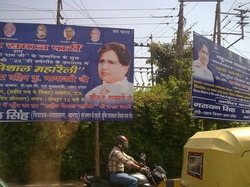 Delhi, India Delhi, India Last but not the least, our academic outputs are forthcoming as a special issue in International Communication Gazette. Each of the five countries produced a focused paper on the most salient aspects of youth activism through ICTs found in their country. You will expect to see them out in March/April this year. But we have done much more than the five papers. Each of the five countries also compiled a background report of the very basic information of the country, including youth population, ICT penetration rates, participation policies, media policies, youth policies, development of new media, and political culture and climate. These reports can be found here. Recently Prof. Yang Guobin listed eight books on new media and China published since 2010. The list is here. He mentioned that there were at least eight books on the same topic published before 2009. I wonder what the eight are and send a help request to my academic friends all over the world. Here are what I found so far. I would love to complete the list if you find any books missing.
杨国斌老师最近总结的2010以来有关新媒体与中国的著作列表非常实用,文中提到2009之前至少还有八本这样的著作。我咨询了世界各地的学术朋友,企图建立一个2009之前的列表。如果您发现有任何遗漏请不吝告知。列表分为(1)只关注中国与资讯传播科技的著作以及(2)包含有关中国与资讯传播科技的章节的著作,按照时间顺序排列。 -------------Books that exclusively focus on China and ICTs----------------------- China in the information age : Telecommunications and the dilemmas of reform / Milton Mueller, Zixiang Tan. Westport, Conn. : Praeger published with the Center for Strategic and International Studies, Washington, D.C., 1997. 1Chinese Reform and the Information Economy 2Channeling Growth into the National Hierarchy: The Ministry of Posts and Telecommunications 3Socialist Competition: Lian Tong and the Golden Projects 4Privatization, with Chinese Characteristics 5Controlling the Computer: China Confronts the Internet 6Trade and Foreign Investment 7Conclusion: Principles and Scenarios Telecommunications and development in China / edited by Paul S.N. Lee. Cresskill, N.J. : Hampton Press, 1997. 1Telecommunications and Development: An Introduction / Paul S. N. Lee 2Learning From the Evolution of Telecommunications in the Developed World / Benjamin J. Bates 3A History of Telecommunications in China: Development and Policy Implications / Zhou He 4The Political Economy of the Communication System in China / Leonard L. Chu 5Uneven Development of Telecommunications in China / Paul S. N. Lee 6Telecommunications and Development in Shanghai: A Case Study / Jianguo Zhu 7China's Use of the Internet: A Revolution on Hold / Bryce T. McIntyre 8China's Satellite Technology: Developments, Policies, and Applications / Junhao Hong 9The China-Hong Kong Relationship in Telecommunications / Michael Zhaoxu Yan 10The Beginning of a New Era: Privatization of Telecommunications in Taiwan / Georgette Wang, Fan-Tung Tseng 11China's Telecommunications: Options and Opportunities / John Ure 12The Impact of Foreign Linkages on Telecommunications and Development in China / Zixiang (Alex) Tan 13Creating a Telecommunications Free Trade Zone in Greater China / Milton Mueller You've got dissent! : Chinese dissident use of the Internet and Beijing's counter-strategies / Michael Chase, James Mulvenon. Santa Monica, CA : RAND, National Security Research Division Center for Asia Pacific Policy , 2002. Ch. 1Political use of the Internet in China Ch. 2Government Counterstrategies China and the Internet : politics of the digital leap forward / edited by Christopher R. Hughes and Gudrun Wacker. London; New York : RoutledgeCurzon, 2003. Introduction: China's digital leap forward / Christopher R. Hughes, Gudrun Wacker 1ICTs in China's development strategy / Xiudian Dai 2Internet growth and the digital divide: implications for spatial development / Karsten Giese 3The Internet and censorship in China / Gudrun Wacker 4Network convergence and bureaucratic turf wars / Junhua Zhang 5(Re-)Imagining 'Greater China': Silicon Valley and the strategy of siliconization / Ngai-Ling Sum 6What's in a name? China and the Domain Name System / Monika Ermert, Christopher R. Hughes 7Fighting the smokeless war: ICTs and international security / Christopher R. Hughes Civil society and Internet revolutions in China / Tai Zixue Ann Arbor, Mich. : UMI, 2004. Chinese cyberspaces : technological changes and political effects / edited by Jens Damm and Simona Thomas. Milton Park, Abingdon, Oxon ; New York : Routledge, 2006. Introduction / Jens Damm and Simona Thomas -- Government policy and political control over China's Internet / Eric Harwit and Duncan Clark -- In the crossfire of demands : Chinese news portals between propaganda and the public / Johan Lagerkvist -- Comrade to comrade networks : the social and political implications of peer-to-peer networks in China / Michael Chase, James Mulvenon, and Nina Hachigian -- China's e-policy : examples of local e-government in Guangdong and Fujian / Jens Damm -- Industrialization supported by informatization : the economic effects of the -- Internet in China / Xie Kang -- Net business : China's potential for a global market change / Simona Thomas Historicizing online politics : telegraphy, the Internet, and political participation in China / Zhou Yongming. Stanford : Stanford University Press, c2006. 1Telegraphy, culture, and policymaking 2Telegraphy, newspapers, and public opinion 3Telegraphy, political participation, and state control 4Public telegrams and nationalist mobilizations 5Telegraph power : textual and historical contexts 6China and the Internet : proactive development and control 7Negotiating power online : the party state, intellectuals, and the Internet 8Living on the cyber border : Minjian online political writers in China 9Informed nationalism : military Web sites in Chinese cyberspace The Internet in China : cyberspace and civil society / Zixue Tai. New York : Routledge, 10/2006. Chinese Cyber Nationalism: Evolution, Characteristics, and Implications / Wu Xu Lanham : Lexington Books, c2007 Introduction -- Evolution: Enlightenment in the ivory tower -- Say no to Indonesia's anti-Chinese riot -- Sino-U.S. cyber wars -- Post 9/11 transition of priority -- Direct confrontations with Japan -- Definitions: Chineseness -- Cyber public sphere -- Nationalism -- Chinese nationalism -- Chinese cyber sphere -- Cyber nationalism -- Chinese cyber nationalism -- Reflections: Key players -- Policy makers -- General online public -- Inconclusion. Technological empowerment : the Internet, state, and society in China / Yongnian Zheng. Stanford, Calif. : Stanford University Press, c2007. Politics of technological empowerment: science vs. democracy -- Information technology, nation-state building, and social movement -- Regulatory regime and political control -- The Internet, political liberalization, and political democratization -- The Internet, civic engagement, and public distrust -- Interaction strategies, collective action, and political consequences -- Information technology, state-society relations, and political changes The Internet and rural development in China : the socio-structural paradigm / Jinqiu Zhao. Bern : Peter Lang AG, 2008. China's information and communications technology revolution : social changes and state responses / edited by Xiaoling Zhang and Yongnian Zheng. Abingdon, Oxon [England]; N.Y., NY: Routledge, 2009. 1Historical imagination in the study of Chinese digital civil society / Guobin Yang 2Dancing thumbs: mobile telephony in contemporary China / Zhenzhi Guo, Mei Wu 3Regulating e gao : futile efforts of recentralization? / Bingchun Meng 4In the name of good governance: e-government, Internet pornography and political censorship in China / Guoguang Wu 5Chinese intellectuals and the Internet in the formation of a new collective memory / Junhua Zhang 6From "foreign propaganda" to "international communication": China's promotion of soft power in the age of information and communication technologies / Xiao Ling Zhang 7Web engineering in the Chinese context: "let a hundred flowers bloom, a hundred schools of thought contend" / Kieron O'Hara 8The political cost of information control in China: the nation-state and governance / Yongnian Zheng The power of the Internet in China : citizen activism online / Guobin Yang. New York : Columbia University Press, 2009. 1Online activism in an age of contention 2The politics of digital contention 3The rituals and genres of contention 4The changing style of contention 5The business of digital contention 6Civic associations online 7Utopian realism in online communities 8Transnational activism online Jack Linchuan Qiu (2009). Working-Class Network Society: Communication Technology and the Information Have-Less in Urban China. Cambridge, MA: The MIT Press. --------------------Books that contain chapters on China and ICTs-------------------- Asia.com : Asia encounters the internet / edited by K.C. Ho, Randolph Kluver, and Kenneth C.C. Yang. London ; New York : RoutledgeCurzon, 2003. 1Asia encounters the Internet / K. C. Ho, Randolph Kluver, Kenneth C. C. Yang 2The state of Internet use in Asia / Tim Beal 3Catching up and falling behind: inequality, IT, and the Asian diaspora / Anthony P. D'Costa 4Cyberspace, surveillance, and social control: the hidden face of the Internet in Asia / David Lyon 5Global technology meets local environment: state attempts to control Internet content / Carolyn Penfold 6Piracy, open source, and international intellectual property law / Debora Halbert 7From real to virtual (and back again): civil society, public sphere, and the Internet in Indonesia / Merlyna Lim 8Malaysiakini.com and its impact on journalism and politics in Malaysia / James Chin 9Who is setting the Chinese agenda? The impact of online chatrooms on party presses in China / Xiguang Li, Qin Xuan, Randolph Kluver 10Clicking for votes: assessing Japanese political campaigns on the web / Leslie M. Tkach-Kawasaki 11The Tamil diaspora, Tamil militancy, and the Internet / Shyam Tekwani 12Construction and performance of virtual identity in the Chinese Internet / Karsten Giese 13Opening a Pandora's box: the cyber activism of Japanese women / Junko R. Onosaka 14Support and spewing: everyday activities of online Hindu groups / K. S. Arul, Maragatha Muthu Selvan 15Communication and relationships in online and offline worlds: a study of Singapore youths / Waipeng Lee, Brenda Chan Open networks, closed regimes : the impact of the Internet on authoritarian rule / Shanthi Kalathil, Taylor C. Boas. Washington, D.C. : Carnegie Endowment for International Peace, c2003. Ch. 1The Conventional Wisdom: What Lies Beneath? Ch. 2Wired for Modernization in China Ch. 3Channeling a "Limited" Resource in China Ch. 4Catching Up and Cracking Down in Singapore, Vietnam, and Burma Ch. 5Technology and Tradition in the United Arab Emirates, Saudi Arabia, and Egypt Ch. 6Beyond Blind Optimism Media and cultural transformation in China / Haiqing Yu. Milton Park, Abingdon, Oxon ; New York, NY : Routledge, 2009. I thought my enthusiasm for journalism has long died since I decided to turn down the job offers from two Chinese "party-organ" newspapers in 2001. But it does not seem to be the case until I encountered quite a few events/people/perspectives recently. |
Weiyu Zhang
I am an Associate Professor at Department of Communication and New Media, National University of Singapore. Categories
All
Archives
January 2019
|


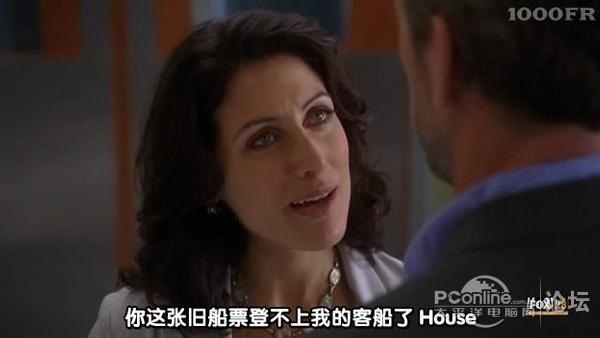
 RSS Feed
RSS Feed
